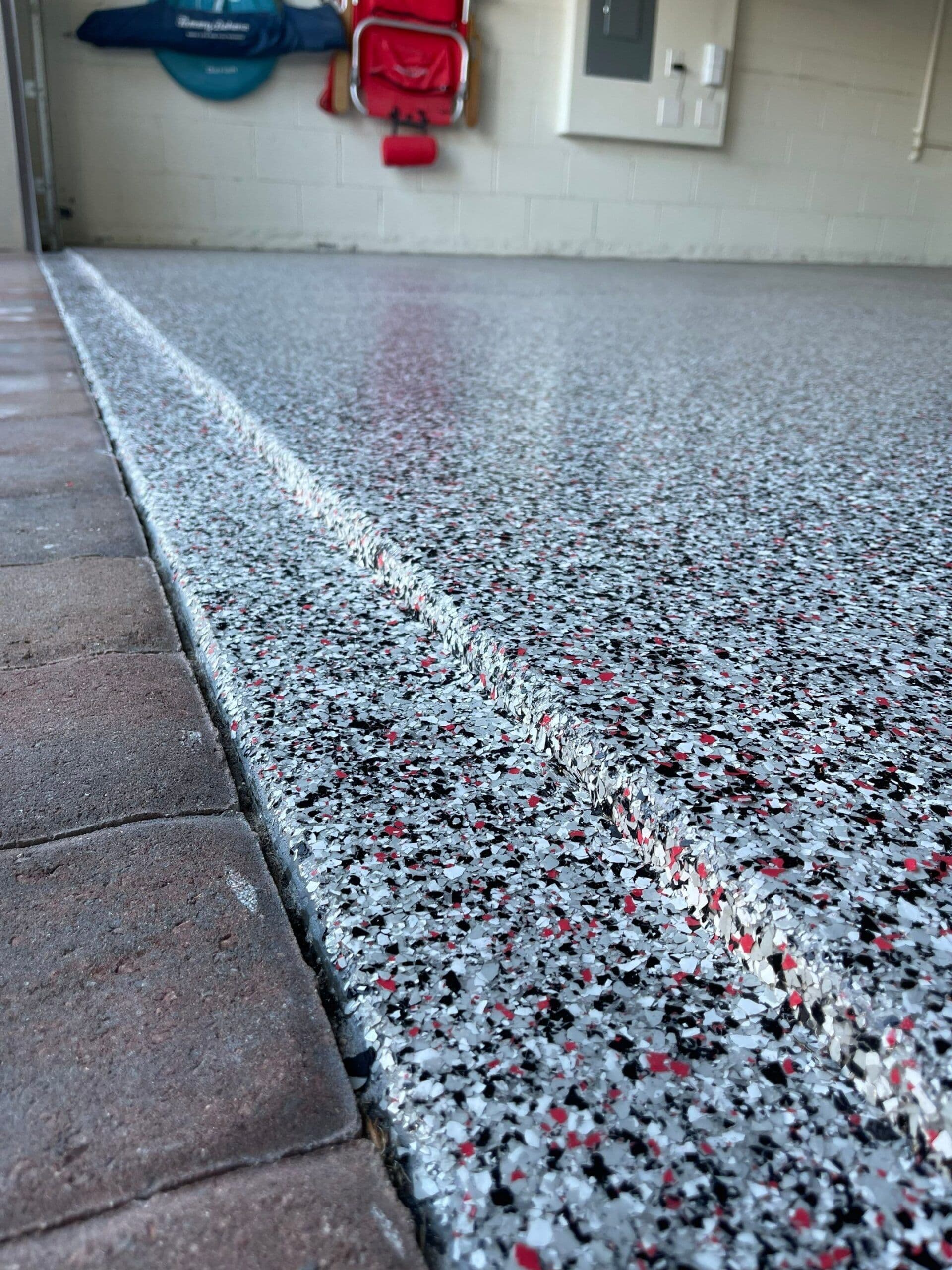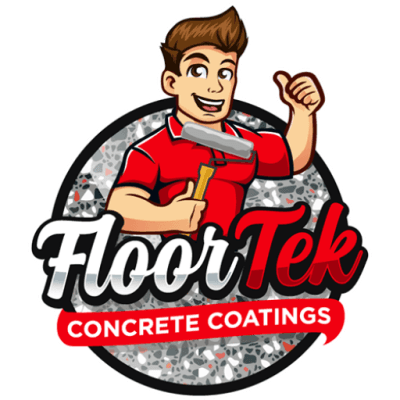Garage Floor Epoxy vs Polyaspartic: Which Is Best for Your Garage?
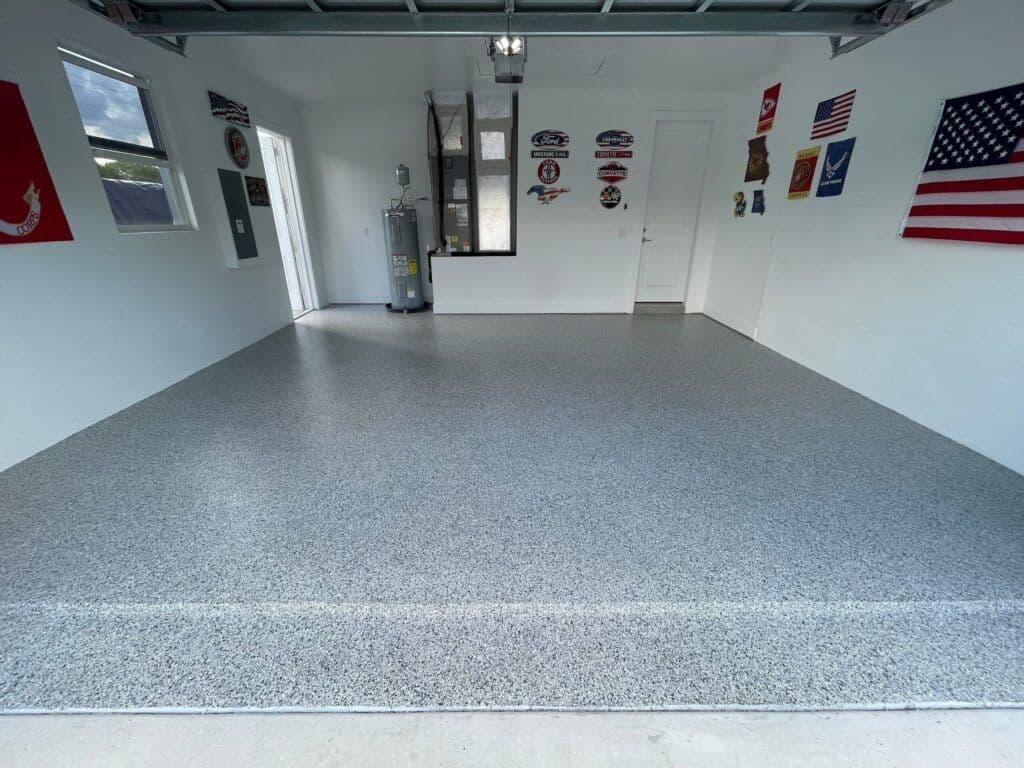
Hello, I’m speaking to you from Floortek, and we’ve seen a lot of garage floors. We’re often the team called in to fix a floor that has failed, peeled, or turned a strange yellow color. When homeowners ask us about Garage Floor Epoxy vs Polyaspartic: Which Is Best for Your Garage?, our answer is always based on our direct, hands-on experience and expertise.
For years, you've been told epoxy is the go-to solution. You can find it in big-box stores, and many companies still push it. But here is the truth we've learned from decades of installations: epoxy is a temporary fix that is practically guaranteed to fail.
We don't sell epoxy. We replace it.
We specialize in pure polyaspartic coatings because they represent the most durable, long-lasting, and reliable technology available for concrete. This isn't just an opinion; it's a fact based on the science of these materials. Our polyaspartic systems are 10X better than epoxy.
We want to show you the real-world differences so you can make an informed choice. To help you make that switch, we are currently offering 30% off the first installation for new customers.
What is Epoxy Flooring (And Why Does It Fail So Often?)
Epoxy is a two-part resin system that, when mixed, creates a chemical reaction and hardens into a rigid, solid coating. It's been the "traditional" coating for decades, mainly because it was the only widely available option.
Its main appeal is that it looks good right after installation. It’s shiny, it covers stains, and you can even get DIY kits for it. But this is where the problems begin. Epoxy's very nature—its rigid, plastic-like structure—is its greatest weakness.
As a professional garage resurfacing company, the majority of our work involves tearing out these failed floors. Let’s look at the most common failures we see every single day.
Failure #1: "Hot Tire Pickup" — Epoxy's Biggest Flaw
This is the number one complaint we hear. You drive your car on a hot day, park in the garage, and your tires are extremely hot. This heat radiates into the epoxy, softening the rigid resin. As the tires cool down overnight, they contract, and the rubber literally grips the epoxy, ripping it right off the concrete, leaving a bare spot.
This is called "hot tire pickup," and it’s a critical failure of epoxy’s weak bond. It happens in the hot summers of the South just as easily as it does in the North. Once this happens, the floor is compromised, and the only fix is to grind it all down and start over.
Our polyaspartic system, by contrast, has a much higher heat tolerance and forms a more profound, molecular bond with the concrete. It will not lift or peel from hot tires.
Failure #2: Yellowing and Fading from Sunlight
Does your garage have a window? Do you like to leave the garage door open on a nice day? If you have an epoxy floor, that sunlight is destroying it.
Epoxy is not UV stable. Exposure to the sun's ultraviolet rays triggers a chemical reaction in the resin, causing it to break down. This results in "ambering"—the floor turning a sickly yellow or brownish color over time. A beautiful light gray or blue floor can look old and dirty in as little as one or two years.
This is a fundamental flaw in the chemistry of epoxy. It’s not a question of if it will yellow, but when.
Failure #3: Cracking and Peeling from Climate Stress
This brings us to the debate of Garage Floor Epoxy vs Polyaspartic: Which Is Best for Your Garage? in a varied climate like the United States. Concrete is not a static block; it is porous and it moves. It expands in heat and contracts in cold temperatures.
Epoxy cures into a rugged, rigid shell. It has almost no flexibility. When the concrete underneath it contracts during a cold winter, the rigid epoxy can't move with it, so it cracks. When the ground shifts or the concrete expands in the heat, the epoxy is pushed up and delaminates (peels).
This is especially bad in states with freeze-thaw cycles. Moisture gets into the concrete, freezes, and expands, causing the epoxy coating to pop right off. Epoxy cannot handle the seasonal stress that is common across the entire country.
What is Polyaspartic Coating? (The Modern, Durable Solution)
So, what is the alternative? Polyaspartic coating is an advanced polymer, technically a type of polyurea. It was initially developed for heavy industrial uses—coating steel bridges to prevent rust, protecting pipelines, and covering floors in high-demand environments like hospitals and airplane hangars.
At Floortek, we have adapted this industrial-grade technology for your home, unlike epoxy, which sits on top of the concrete, polyaspartic wicks into the concrete, bonding with it on a molecular level.
The most significant difference is flexibility. Polyaspartic retains a flexible, elastic quality (up to 300% elongation) even after it cures. This means that as your concrete expands and contracts with the seasons, our polyaspartic coating flexes with it. It will not crack, chip, or peel due to temperature changes or ground movement.
This superior technology is the foundation of Our Coating Products and the reason we can offer a reliable Life-of-home warranty.
An Honest Comparison: Garage Floor Epoxy vs Polyaspartic
Let’s directly compare the two. When you're a homeowner weighing Garage Floor Epoxy vs Polyaspartic: Which Is Best for Your Garage?, these are the points that truly matter.
Ready to upgrade your garage floor? Contact us today for a free quote and take advantage of our 30% off promotion.
Durability and Bond Strength: Why We Say Polyaspartic is 10X Better
We claim our system is 10X better than epoxy, and here’s why. In lab testing, polyaspartic coatings show 3-4 times the abrasion resistance of epoxy. This means it's far more resistant to scratches from dropped tools, chemicals, and vehicle traffic.
But the real advantage is the bond. As we mentioned, polyaspartic wicks deep into the concrete's pores. Epoxy, on the other hand, forms a more topical bond. This is why epoxy is so prone to hot-tire pickup and peeling, while our polyaspartic garage coating forms a permanent bond that won’t let go. You can discover the drawbacks of epoxy garage floors for yourself, but the most significant is the potential for bonding failure.
Installation Time: The Difference Between a Week and a Day
This is a massive benefit for you as a homeowner.
An epoxy installation is a lengthy and time-consuming process. It typically takes 3 to 7 days to install and fully cure. During that time, your garage is completely unusable. You have to park on the street and can't access anything in your garage.
A polyaspartic installation is one of our 1-day floor coatings. Our professional team arrives in the morning, prepares the floor, applies our multi-layer system, and completes the work by evening.
Thanks to its advanced chemical reaction, our polyaspartic coating cures incredibly fast. You can walk on your new floor in just 4-6 hours and park your car on it 24 hours later. We will return your garage to you within one day. We are the experts in 1-day garage floors.
Be wary of any garage floor painting company that promises one-day epoxy garage floors. Rushing an epoxy job is a recipe for failure, as the layers won't cure or bond properly.
UV Stability: A Floor That Never Yellows
Remember the "ambering" or yellowing problem with epoxy?
Epoxy: Is not UV stable. It will fade and turn yellow when exposed to sunlight.
Polyaspartic: Is 100% UV stable. It is chemically engineered to be color-fast. The clear topcoat will never yellow, and the color you choose is the color it will stay for the life of your home. You can leave your garage door open all day, every day, and your floor will look just as good in 20 years as it did the day we installed it.
Health and Fumes (VOCs)
Epoxy coatings, especially the cheaper 100% solids versions, are notorious for releasing high levels of Volatile Organic Compounds (VOCs). These are strong, chemical fumes that can be unpleasant and linger in your home for days or even weeks after installation.
Our polyaspartic systems are low-VOC or even zero-VOC. This means a much safer installation process for our team and your family. The mild odor dissipates quickly, and your home’s air quality remains unaffected.
The Floortek Process: Why Preparation is Everything
The most essential part of any floor coating installation isn't the coating itself—it's the prep work. This is where 99% of DIY kits and inexperienced garage coating companies near you fail.
Epoxy kits come with a small packet of "acid etch" solution. This is just a mild acid (like citric acid) that is supposed to "clean and profile" the concrete. It's ineffective and unreliable. It doesn't truly open the pores of the concrete, which is why these floors peel so quickly.
At Floortek, we never acid etch.
Our process is mechanical and professional. We use industrial-grade, 800-pound diamond grinders to abrade the entire concrete surface mechanically. This process, as outlined by government standards like those from the U.S. General Services Administration, is the only proper way to profile concrete. This grinding removes the weak top layer of concrete (the "laitance") and opens up the pores.
This creates a fresh, porous surface that our polyaspartic base coat can soak into, forming a permanent, wicking bond with the concrete. You can read more about How To Prepare Your Floor For A New Polyaspartic Concrete Coating on our blog.
Without this grinding step, any coating—whether epoxy or polyaspartic—is merely paint sitting on a weak surface, waiting to peel.
More Than Just Garages: Where Else Can You Use Polyaspartic?
Because our polyaspartic system is so durable, flexible, and UV-stable, it’s the perfect solution for almost any concrete surface inside or outside your home. The same technology that produces the best one-day garage floor coatings also transforms other problem areas.
Patios: Our patio coating service is extremely popular. It seals ugly, cracked patios, is 100% UV stable so it won't fade in direct sun, and is easy to clean.
Pool Decks: We can coat your pool deck to make it beautiful and uniform. Our pool deck coating service creates a clean, sealed surface.
Driveways & Sidewalks: Say goodbye to road salt, stains, and cracks. Our driveways coating service and sidewalks coating service protect your curb appeal and make snow and ice removal easier.
Basements: Transform a dark, dusty basement into a bright, usable living space. Our Basement coating service seals the concrete.
Your Style, Your Floor: Customizing Your Space
A durable floor doesn't have to be boring. We offer a vast range of styles to match your home's aesthetic. You can choose from hundreds of combinations. We offer a full range of Colors and Flake Options available.
Whether you want a simple, solid color or a decorative, granite-like flake broadcast, you can design the exact look you want. You can view our full selection of Colors and flake options to find the perfect match for your home.
Making the Right Choice: Garage Floor Epoxy vs Polyaspartic
So, we return to the central question: Garage Floor Epoxy vs Polyaspartic: Which Is Best for Your Garage?
After years in this industry, our answer is clear and unwavering.
Epoxy is an outdated, rigid, and temporary coating. It is a "floor paint" that is guaranteed to fail due to hot tires, yellowing from the sun, and cracking with seasonal temperature changes.
Polyaspartic is a modern, flexible, and permanent flooring system. It bonds with your concrete, flexes with it, withstands extreme temperatures, and will never yellow.
When deciding between garage floor epoxy and polyaspartic, you're choosing between a short-term headache and a long-term solution. You can find a direct comparison of garage-floor epoxy vs. polyaspartic on our blog, but real-world evidence is what drives our business.
We are not just a coating company; we are concrete solution experts. You can learn more about us and our commitment to quality.
Frequently Asked Questions about Garage Floor Epoxy vs Polyaspartic
Here are the most common questions we receive from homeowners trying to determine the best option for their garage: Garage Floor Epoxy vs. Polyaspartic - Which Is Best for Your Garage? Puzzle.
1. What is the main difference between epoxy and polyaspartic for a garage floor?
The most significant differences are flexibility and cure time. Epoxy is rigid and takes days to cure. Polyaspartic is flexible (so it won't crack) and can be installed in just one day.
2. Why does my neighbor's epoxy floor look yellow?
That is called "ambering." Epoxy is not UV-stable, and sunlight breaks down the resins, causing them to turn a yellowish color. Polyaspartic coatings are 100% UV stable and will never yellow.
3. Will a polyaspartic floor peel from hot tires like epoxy does?
No. Hot tire pickup is a key failure mode of epoxy due to its weak bond and low heat tolerance. Our polyaspartic system bonds to the concrete and has a much higher heat tolerance. It will not lift or peel from hot tires.
4. Is polyaspartic more durable than epoxy?
Yes, significantly. Lab tests show polyaspartic is 3-4 times more resistant to abrasion than epoxy. It's a tougher, more flexible, and more chemically resistant coating, which is why we say it's 10X better than epoxy.
5. How long do I have to wait to use my garage with a polyaspartic coating?
You can walk on your new floor in just 4-6 hours, and you can drive your car on it in 24 hours. This is a key advantage of our 1-day floor coatings. An epoxy floor can take 5-7 days before you can park on it.
6. Can't I install an epoxy kit from a hardware store?
You can, but we strongly advise against it. Those kits use weak, water-based "epoxy paints" and rely on ineffective acid etching for prep. They are guaranteed to peel and fail, often within a year. You will end up paying a professional like us to do it right.
7. Is the installation process for epoxy and polyaspartic the same?
No. Proper polyaspartic installation requires mechanical diamond grinding to prepare the concrete. Most epoxy installers use a weaker acid wash. The superior prep is a significant reason why polyaspartic floors last.
8. What's the best garage floor coating for climates with hot summers and cold winters?
Polyaspartic is the clear winner. Its flexibility allows it to expand in the summer heat and contract in the winter cold, right along with the concrete—rigid epoxy just cracks and peels under this kind of seasonal stress.
9. My concrete is old and has cracks. Can you still coat it?
Absolutely. Our preparation process includes repairing cracks and pits before we apply the base coat. We create a smooth, beautiful, and new surface for your garage.
10. How do I get a quote for a polyaspartic garage floor?
You can contact us directly or call our team at 844-844-4164. We provide a Free Quote with no obligation.
Your Permanent Garage Floor Solution
Don't settle for a temporary fix that will chip, yellow, and peel. You've seen the Gallery of our transformations. You've seen the difference between a cheap epoxy "paint" and a professional polyaspartic system.
Your home deserves a floor that performs as well as it looks—a floor that will last.
We are ready to show you the Floortek difference. Please take advantage of our 30% off on the first installation promotion for new customers.
Get your Free Quote today by calling us at 844-844-4164 or by filling out our simple online Contact us form. We look forward to giving you a garage floor you can be proud of.
FREE In-Home Estimate
Plus 30% Off
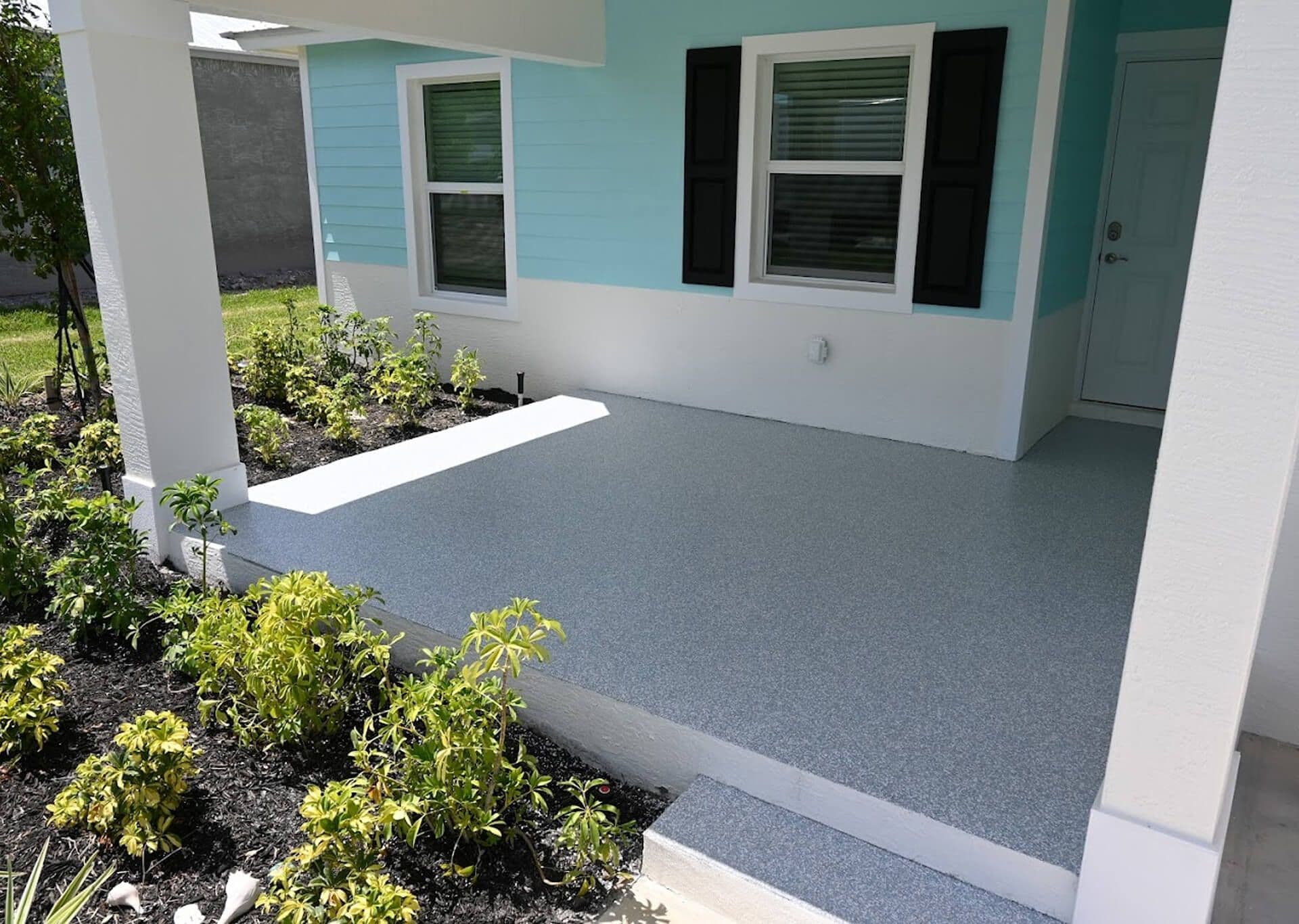
Testimonials
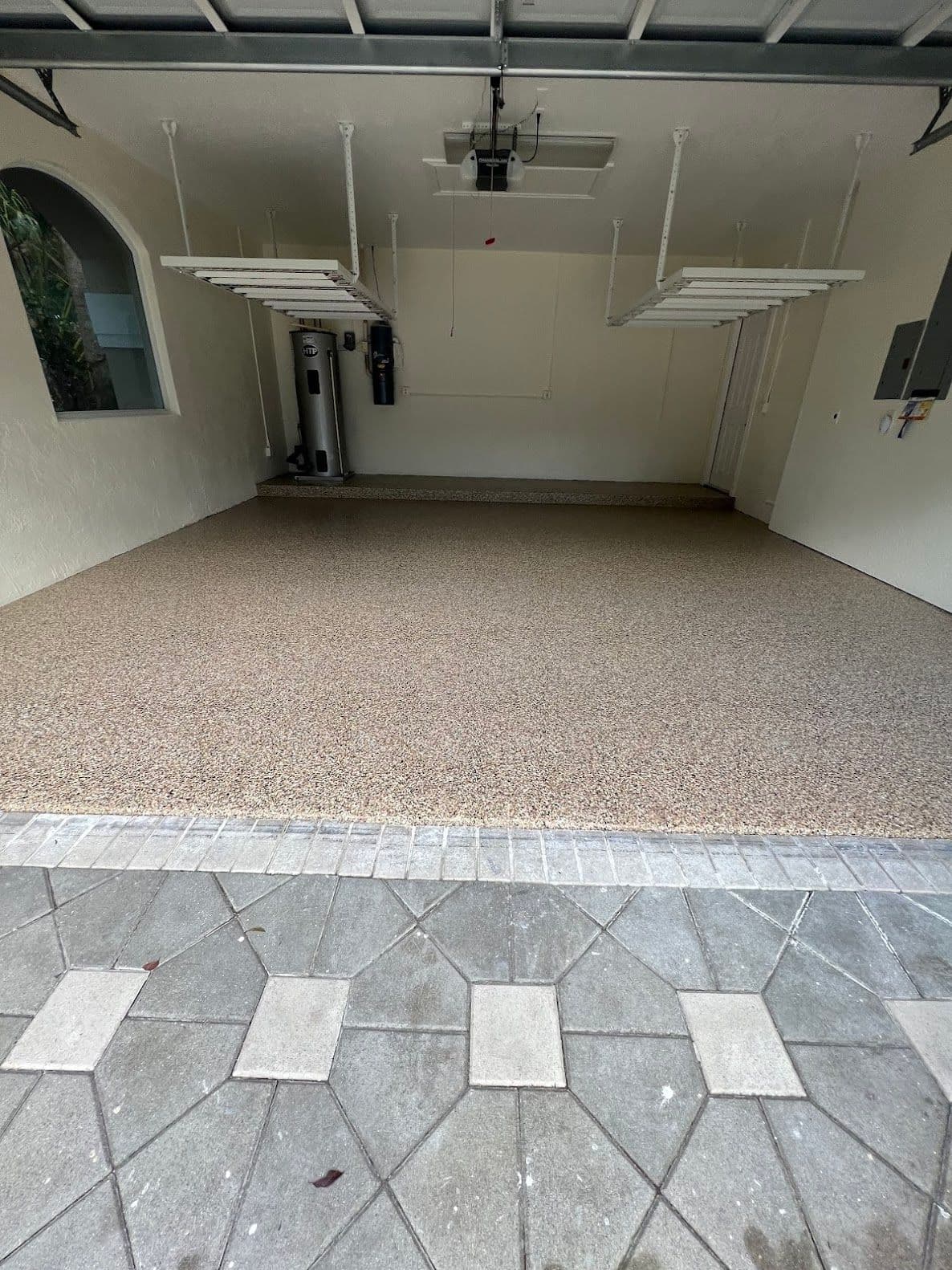
We had both of our garages done and an outdoor concrete platform. The crew was courteous and professional. Everyone from Nancy our salesperson to Patrick, the manager, Logan and his crew were outstanding. Our floors look fantastic and we were very happy we chose this company.
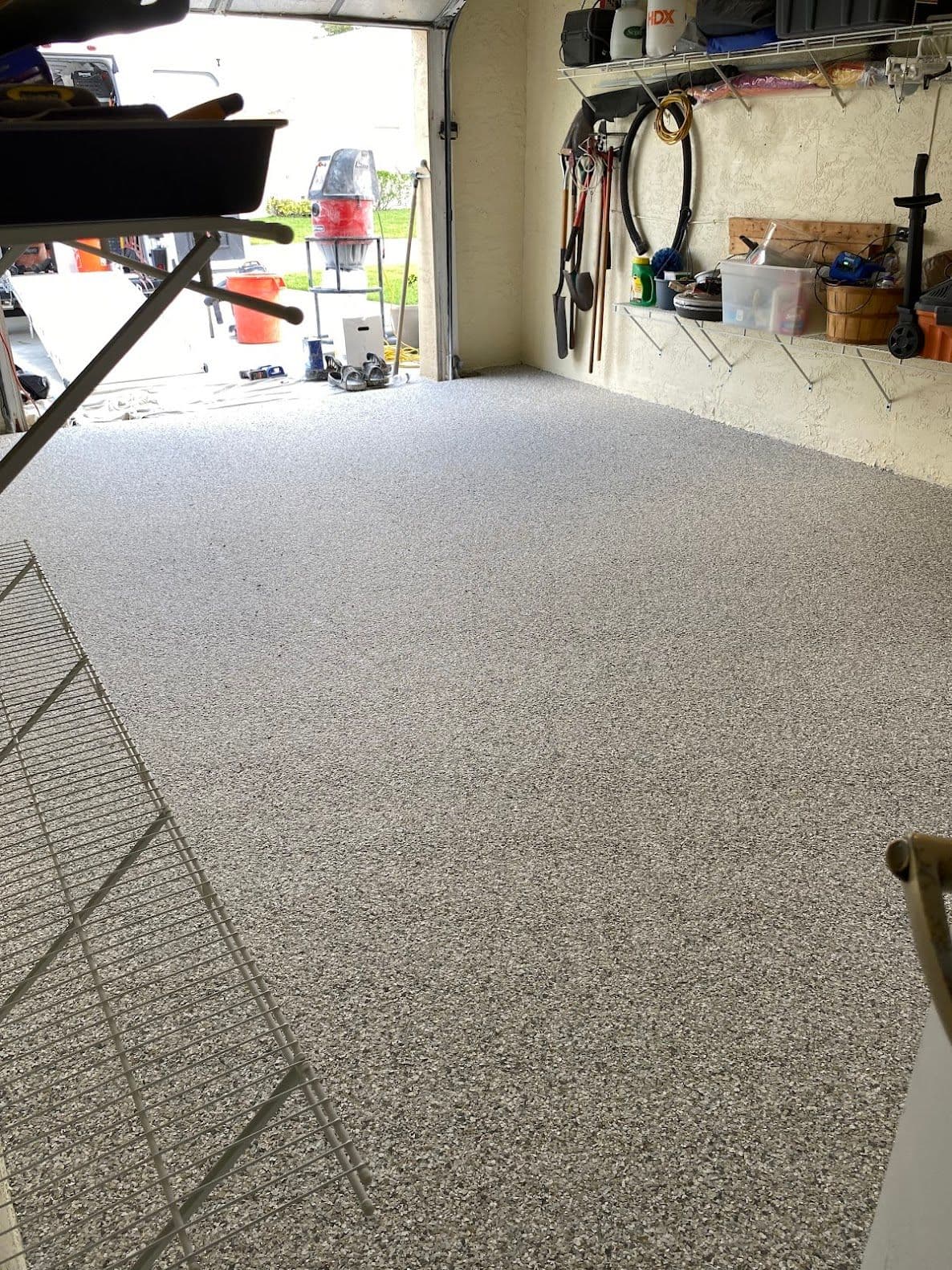
I am very pleased with the quality of work FloorTek has done for me. The two employees that did the actual work were very courteous, worked hard, and explained everything they were doing. Thank you for a great job.
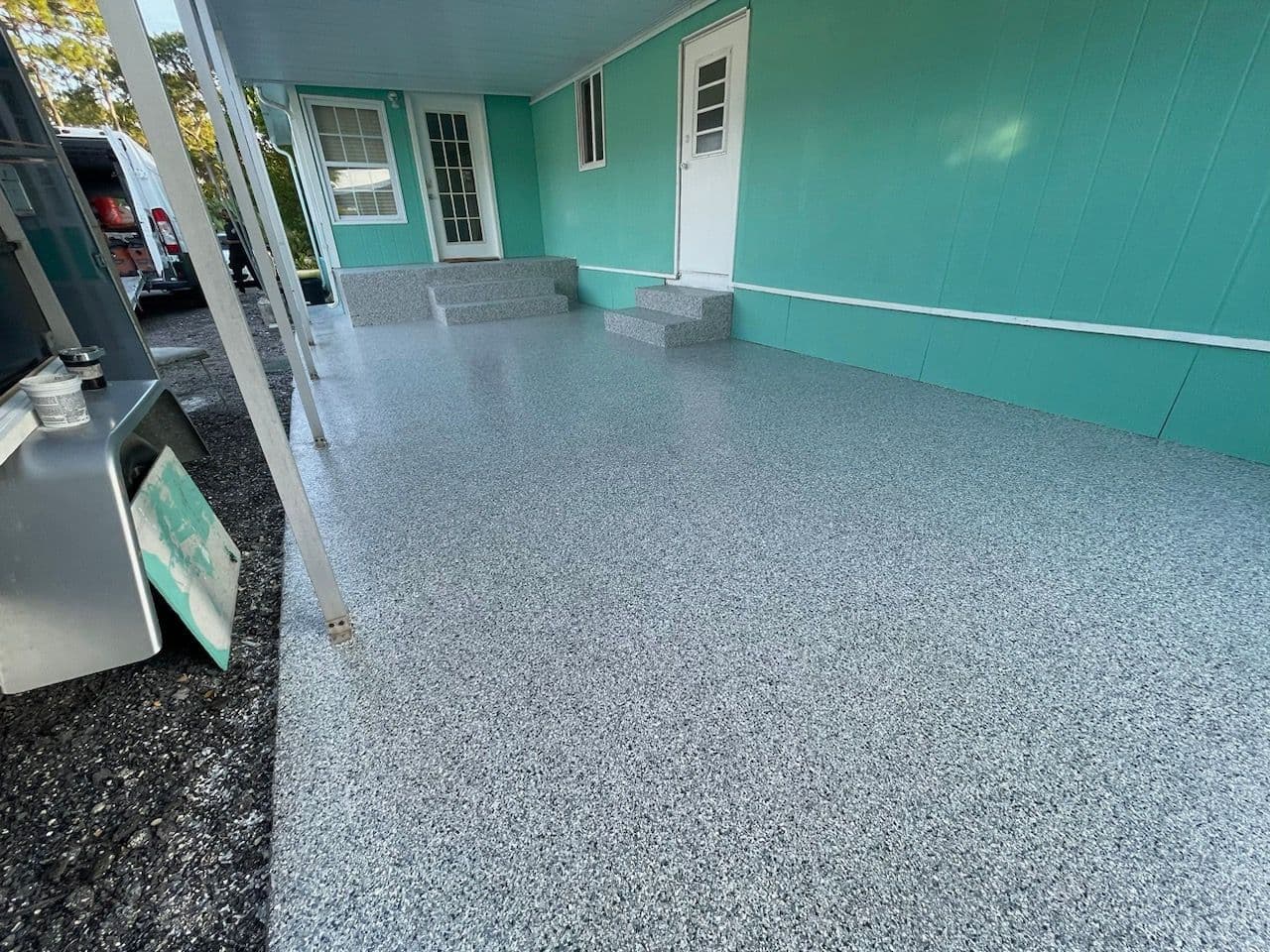
I was happy with the job Floortek did. Good customer communication and customer relationship. My old ugly porch was transformed and I love it. Nancy was very helpful throughout the process. Just know that rain may impact your schedule to make sure the products at highest quality during application.



Contact FloorTek Today
